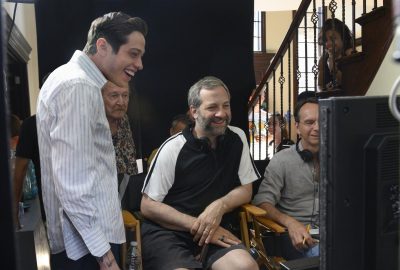While director Judd Apatow was preparing for his latest film, he asked a firefighter if his job ever got boring, if it was a pain to deal with trivial problems like rescuing a cat from a tree or helping someone who fell down.

The sincerity of the firefighter’s response — “I know this sounds corny, but we just really like helping people” — touched Apatow.
“I think it is that very everyday quality that to me was so powerful,” he said. “This was just the way they chose to live their life.”
In a Zoom roundtable interview, Apatow spoke about his upcoming movie, “The King of Staten Island,” which will be released Friday through video on demand.
The film is a semi-autobiographical story of “Saturday Night Live” comedian Pete Davidson and highlights his struggle with mental illness and grief after the death of his firefighter father who passed tragically.
Davidson stars as Scott Carlin, a lost 24-year-old in Staten Island who must address deep-seated traumas and psychological problems in the midst of great life changes. Carlin, who lost his father at the age of seven, lives as an adult at home with his mother.
As his younger sister leaves for college, his mother begins dating another firefighter and his friends plan for their futures, Carlin is pushed to reevaluate his lifestyle and begin pursuing his goal of becoming a tattoo artist.
Davidson co-wrote the movie alongside Apatow and fellow SNL writer Dave Sirus, sharing details of his life and broaching the subject of mental health issues which he himself faced. After meeting Davidson during a cameo in Amy Schumer’s “Trainwreck” in 2015, Apatow said he found him humorous and his past interesting, and the two started working on a script about Davidson’s life.
“[Davidson is] so funny, darkly comic and willing to talk about things that most people want to keep in,” Apatow said. “I think that’s what draws people to him.”
Apatow, who has directed popular comedies including “The 40-Year-Old Virgin” and “Knocked Up,” said he has a penchant for stories of a flailing soul’s evolution and positive character development. Realizing the sensitive nature of Davidson’s story and relatability with young people, Apatow said he wanted the movie to be positive and helpful while containing humor.
“We’ve all been through horrible grief, we’ve all been through sudden trauma,” Apatow said. “Seeing a character go through it and how they survive it and learn to get help… maybe that would help people in some way, in addition to being funny.”
The film was shot last year in Staten Island, where Davidson grew up and currently lives, which Apatow said provided the film a genuine truth and understanding. He said Davidson accompanied the film crew during location scouting and pointed out places that could be used in the film.
“It’s almost like a land without visitors, and the people who live there, if they don’t commute, tend to hang out there,” Apatow said. “It is its own bubble and its own culture. And we felt like if we shoot the entire movie there, maybe we’ll get a truthful look at what it feels like to be there.”
After quickly scrapping original scripts, the writing trio embarked on writing a personal story that explored more difficult material. Over a period of five months, Apatow and Davidson outlined instances of Davidson’s life that could inspire a fictional story.
Before adding his own ideas to the script, Apatow said, he wanted to hear how Davidson thought people would talk, what he thought was funny and what dramatic scenes he would include in the film.
Even after the script was complete, Apatow said he thinks improvisations from the cast on screen added layers of character complexity and authenticity. Comedic and acting personalities in the film, including Bill Burr, Marisa Tomei and Steve Buscemi, offered off-script lines that impacted the final cut.
“We always find moments in those takes that are better than most of what we scripted,” Apatow said. “If you create that looseness out of the blue, Bill Burr is going to come up with a line that you would never have thought of in a million years.”
Apatow said the entire film process worked from conception to completion because of the people who were brave enough to share their stories and talent.
“We were trying to make a fictional movie that was emotionally truthful,” Apatow said. “Even though most of the movie is made up and didn’t happen, when it was over, you would feel like you really got to know Pete and what he’s been through.”




